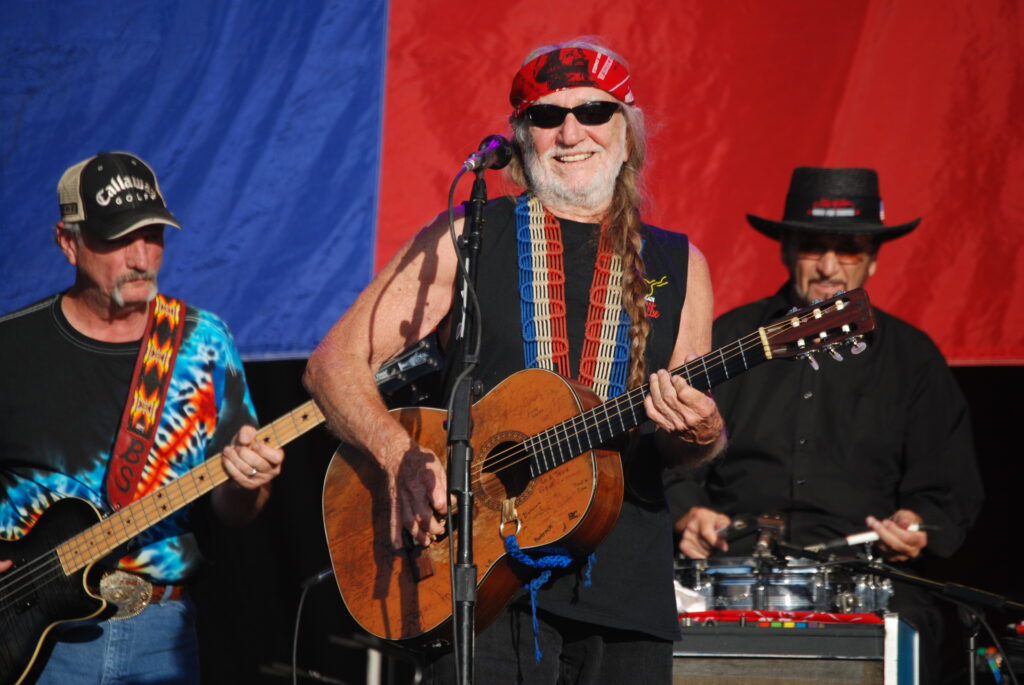Born in Fort Worth, Texas, on April 29, 1933, Willie Nelson is a well-known American guitarist and songwriter who became well-known as one of the most adored country music singers of the late 20th century. His grandfather, who taught him how to play the guitar, had a big impact on his early foray into the world of music. Willie’s talent was being shown off at neighborhood dances by the time he was ten years old.
Nelson enlisted in the US Air Force following his high school graduation. Still, his passion for music never wavered. Following his discharge from the armed forces, he worked as a disc jockey in Texas, Oregon, and California during the 1950s. He kept up his public performances and refined his songwriting during this time. Nelson relocated to Nashville, Tennessee, in 1961, and he became a bass player in Ray Price’s band there. This was a crucial step for his career because it put him in the center of the country music industry.

Among the first of many musicians to record Nelson’s tunes was Ray Price, who achieved hit records with timeless melodies like “Crazy,” “Hello Walls,” “Night Life,” and “Funny How Time Slips Away,” which Patsy Cline memorably played.
Nelson was a successful songwriter, but his own recordings at first received little attention. When he moved back to Texas and, along with Waylon Jennings, rose to prominence in the outlaw country music scene in the early 1970s, this started to change. This subgenre eschewed the Nashville sound’s refined production in favor of an edgy, raw aesthetic that connected with a wider audience. Nelson’s ascent to stardom in country music was cemented by his breakthrough album, “Red Headed Stranger” (1975), which featured the hit song “Blue Eyes Crying in the Rain.” His lasting connection with President Jimmy Carter was formed during this time.
Nelson was distinguished by his unique musical approach. His usage of a gut-string guitar and easygoing, behind-the-beat singing became his signature sounds. His 1978 album “Stardust” gained notoriety for featuring an odd mix of songs by popular mainstream songwriters, including Irving Berlin and Hoagy Carmichael. With over five million copies sold in the US alone, this record was an enormous success. With the release of “Always on My Mind” (1982) and his duet “To All the Girls I’ve Loved Before” (1984) with Julio Iglesias, he carried on bridging genres.
In addition, Nelson tried his hand at acting, making his screen debut in “The Electric Horseman” (1979). He then went on to feature in “Honeysuckle Rose” (1980), which included the song “On the Road Again,” which has become his signature, and “Red Headed Stranger” (1986), which was a movie based on his album.

Nelson did, however, confront formidable obstacles in the 1990s. His assets were seized because the Internal Revenue Service said he owed $16.7 million in unpaid taxes. He recorded “The IRS Tapes: Who’ll Buy My Memories” (1991) to pay off his debt; at first, it was only accessible through phone orders, but it was eventually released in stores. Nelson had a financial setback, but his career went on. He continued to put out albums, including the reggae-tinged “Countryman” (2005), the atmospheric “Teatro” (1998), and “Across the Borderline” (1993).
Nelson accepted his position as a musical elder statesman as he grew older. His latter releases, such as “Heroes” (2012), “Let’s Face the Music and Dance” (2013), “To All the Girls..” (2013), which is a compilation of duets with female musicians, and “Summertime” (2016), which is an homage to George Gershwin, frequently incorporated classic songs and covers. In addition, he released “Willie’s Stash, Vol. 1: December Day” (2014), which featured duets with his sister Bobbie, a pianist, and “Band of Brothers” (2014), which featured primarily new work. Recordings such as “God’s Problem Child” (2017) and “Last Man Standing” (2018) presented contemplations on death, whilst “My Way” (2018) and “That’s Life” (2021) honored Frank Sinatra. “A Beautiful Time” (2022), “First Rose of Spring” (2020), and “Ride Me Back Home” (2019) are a few more noteworthy albums. During his career, Nelson worked with many different musicians, including jazz trumpeter Wynton Marsalis, Waylon Jennings, and Merle Haggard. In “The Willie Nelson Family” (2021), he collaborated alongside his sister Bobbie and children.

Nelson made a major contribution to social and cultural causes in addition to his music career. In addition to co-founding Farm Aid in 1985 and producing yearly Fourth of July country music concerts in Texas and other states, he also organized festivals to promote American farmers. Well-known for his support of marijuana, Nelson established Willie’s Reserve, a marijuana supply firm, in 2015 when the drug was made legal in a number of states.
Providing insights into his life and beliefs, Nelson has coauthored several memoirs. Co-written with his sister, these include “Roll Me Up and Smoke Me When I Die: Musings from the Road” (2012), “Willie: An Autobiography” (1988), “It’s a Long Story: My Life” (2015), and “Me and Sister Bobbie: True Tales of the Family Band” (2020). In 2021, he co-wrote “Willie Nelson’s Letters to America,” a compilation of humor, guidance, and anecdotes, with Turk Pipkin.

Many honors have been bestowed to Nelson for his contributions to music and culture. In addition to winning the Library of Congress Gershwin Prize for Popular Song in 2015, he was inducted into the Country Music Hall of Fame in 1993 and was given a Kennedy Center Honor in 1998.
One of Willie Nelson’s greatest contributions to American culture and country music is his legacy. His reputation as a legendary figure in the music industry has been solidified by his ability to transcend musical boundaries, his commitment to social concerns, and his inner fortitude in the face of adversity.



Leave a Reply